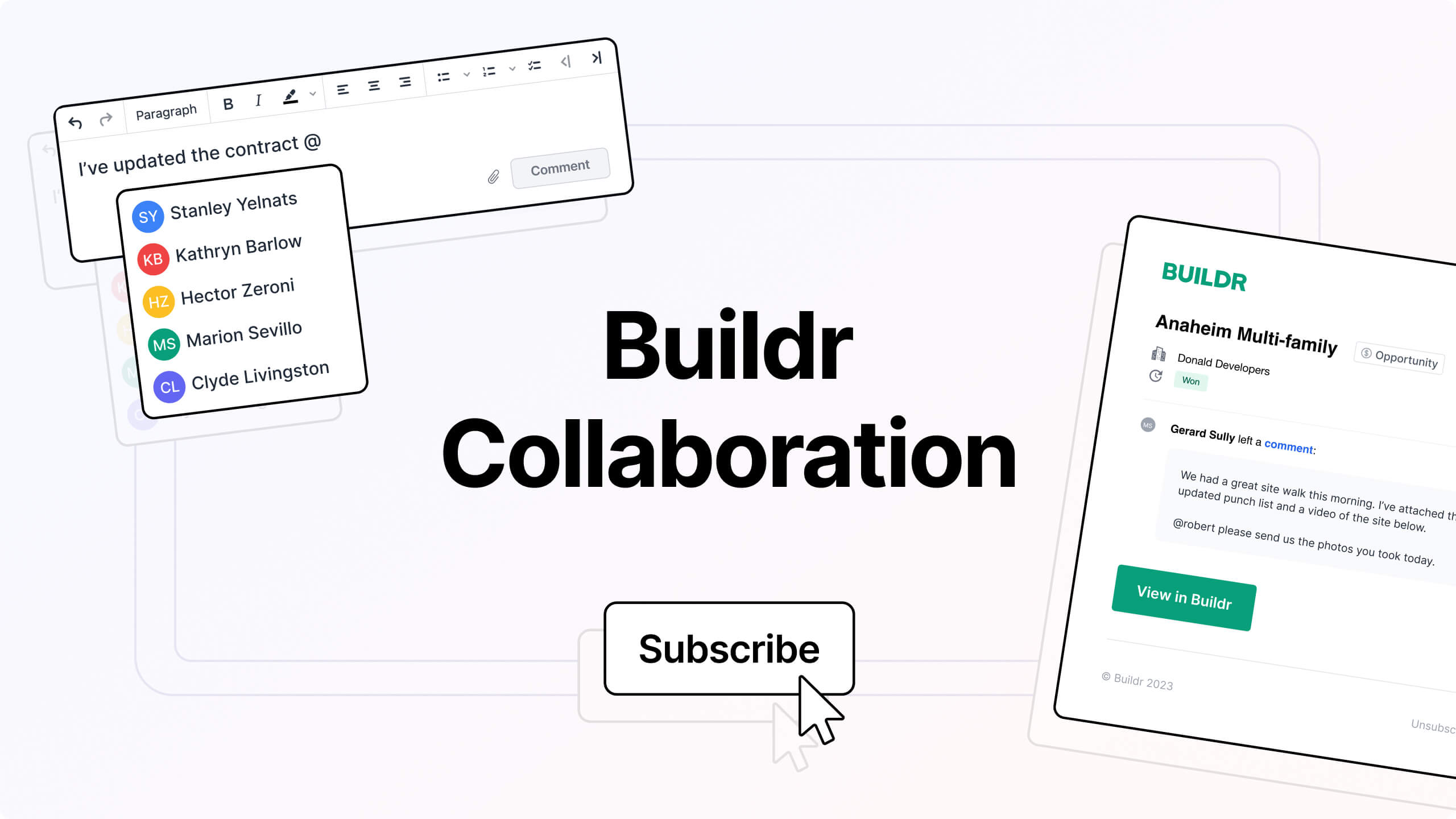
Let's Huddle: Jeffrey Forrest Jr. of WPC
Chatting business development, technology, and all things construction with WPC's Director of Business Development, Jeffrey Forrest Jr.
May 24, 2023
7 min read
Industry Chat

Michael Sullivan
Senior Growth Marketer

Jeffrey Forrest Jr. is Managing Partner and Director of Business Development at WPC, one of the largest general contractors in central Florida. Founded in 1974, WPC is a family-run business with expertise in hospitality, multifamily, senior living, and student housing. Jeffrey is the 3rd generation Forrest to man the ship, and has been in the industry since back when he was working on job sites at 15. He graciously sat down with The SLAB so we could pick his brain about all things construction, technology, and business development.
The SLAB: What’s your biggest business development challenge in construction right now?
Jeffrey Forrest Jr.: Two things—the first is balancing how many opportunities to keep in our pipeline in the short term. We impress on our customers how important it is for jobs to start on time, but the reality is most start dates slide for one reason or another. So it's really challenging to balance between having multiple options available when a team is ready for new work while also following through on all commitments we’re making to customers.
The second challenge is keeping up with current market conditions. I try to stay in the know, at a high level, but last year it was nearly impossible to keep up with pricing while supply chain issues and general inflation wreaked havoc on the industry. We hope this was a once in a lifetime experience. Something I care about getting right is capturing strong data, tracking what we're learning from the market, and using that information analytically.
How have recent market trends affected your business?
In Q4 last year, it felt like we were beginning to stabilize a bit. We’re able to go through a bid cycle and maintain pricing. Supplier inventories are stabilizing, allowing subcontractors to bid with confidence. But for us, I think there's still plenty of unknown around how interest rates and the recent bank failures are going to truly impact construction lending.
So in a nutshell, we've seen some stabilization from a day-to-day operational standpoint. We’re not experiencing what 2022 was like, but we'll see how job starts go the next couple of months to really understand where the market is.
What’s your method of staying up-to-date with industry news and developments?
Personally I stay as plugged in as I can to what we're experiencing on job sites and referencing that against how bids are going in preconstruction. Talking to customers, we pass information both ways. You have to be tuned in to what they're experiencing, looking for potential sites and what they're dealing with with their lenders. Meanwhile, I’m hearing what our subs are saying as they're pricing new work, and hearing from our project managers and our superintendents of what they're dealing with in the field. Otherwise I’m reading traditional media outlets—New York Times, Wall Street Journal, and Florida business journals.
Are there any company-wide branding or marketing initiatives WPC have undertaken to enhance your reputation or visibility in the market?
We have an email newsletter we're bringing back to life. We’re starting to generate more content for that and push it as a way to tie in what we’re putting on our website, publishing to LinkedIn, writing on our blog—and finding ways to share that content internally and externally. And of course, the traditional social media output—Instagram, Facebook, LinkedIn, with an emphasis on staying present and top-of-mind.
You've probably heard about the studies that cite how “behind” the industry is when it comes to technology—how construction is historically technology-averse. When you read these reports and hear critics disparaging the industry’s slow rate of improvement, how does that make you feel?
I understand it. It's been a challenge to implement new technology in our company. But in the last 2-3 years we’ve prioritized finding cloud based solutions, like Procore and Buildr, to improve how we operate. It was a long time coming. We demoed dozens of products over the years, always deciding to stick to what was comfortable. It's hard to make those changes, but by prioritizing intuitive solutions, we've experienced success with employee buy-in.
Simon Sinek has a great book, Start With Why. When we explained to the team why we’re making these changes, focusing on eliminating any duplicate tasks and driving efficiency, it began to click. We’re all looking to spend less of our day on administrative tasks, and more time in the field focused on the construction.
What are some pieces of technology that have checked those boxes of simplicity, learnability, and time-savings that you and your team at WPC use day-to-day?
Within the last couple of years, the core pieces have been Procore, Sage Intacct, and Buildr. Procore is pretty all-encompassing for project operations. We have Sage Intacct for our accounting solution, which integrates directly with Procore. We have Buildr, not only on the CRM and workforce side, but on the project handover side for our closeout and warranty work, which also all integrates directly with Procore. I found out about Buildr after we partnered with Procore, as one of its top integrations.
We've also recently added TimberScan, which is now Titanium, onto Sage Intacct which is helping us with our invoice workflowing. It’s been a huge hit.
We're in the early stages of looking at solutions to automate subcontractor compliance related to pay applications. Procore Pay, which is coming out in Q3, and GCPay are two we’re considering. Our goal is to eliminate manual effort to track down lien releases in order to expedite payment to our subcontractor partners.
Lack of collaboration and the inability to leverage data are the two biggest challenges in preconstruction
Aside from traditional business development duties, you’re also in charge of vetting different pieces of technology to implement at WPC—what are the usual channels you’re hearing about new tech that could work for your team?
The main way that we find new technology is by touching base with people in our network or talking with folks inside the company that may have experienced different tools before coming to WPC. After those two, it's mostly researching online to find compatible tools with ones we’re already using.
Are there any emerging technologies you're keeping your eye on right now?
I hate to be too obvious, but I'm paying a lot of attention to artificial intelligence. I mean, I’m not afraid to admit I use ChatGPT all the time. I don’t copy and paste responses directly, but it helps to generate ideas to get thoughts going. I'm really interested in figuring out—at least on the data collection side— are there better ways for us to dive into our budgets and analyze our information more efficiently?
When we price a project, and it's a $50mm apartment complex, there are sometimes 300 or 400 lines in an Excel sheet of different scopes that were included in that price. And it takes a lot of time for an estimator to pull a few estimates together and compare using those sheets. But is there a way for AI to expedite how we extract information? We’re still researching, but I'm hopeful that AI will play a role in us being more efficient in the future.
They say your clients judge a project not only on the work you do for them, but on the service you supply after the project’s done. Are there any creative ways you find to maintain those customer relationships once the job’s complete?
There are a lot of great builders—obviously across the country—but especially in our market that build the same products we do and do a great job doing so. For us, it's about trying to find creative, win-win solutions for our customers during construction and making sure that we're supporting them. Every project has its challenges, but as long as we're working together, as partners, we’ll find success together.
After construction is complete, we support our customers through our 1-year workmanship warranty period. Past that, we’ll always answer the phone to advise and add value where we can. We see ourselves as part of our clients team and their success helps us maintain our reputation, leading to more work.
How do you think about hiring and retaining talent in light of the labor shortage?
We’re always thinking about hiring and who will be a good fit for the culture while retaining the right people. We strive to provide a great environment to live and work in and to help everybody on our team have a strong work/life balance. That's really the most important thing to me; that we're not clock-watchers expecting people to grind for 90 hours. If the work gets done at a high level and we're able to spend time with our families and have life outside of construction, we focus on that and it seems that our team appreciates it.
There’s a popular stat that approximately 41% of the construction industry is due to retire in the next 10-15 years. With that in mind, how do you see the industry looking in the near future?
It's a really interesting question. I think that these new tools, software, AI and everything that we've talked about—it’s simply not going to replace the physical labor that takes place in the field. I believe in capitalism. As fewer and fewer people get into trades, the value of those positions are going to drive upwards. We are already seeing that with positions in MEP trades. I expect that over time, the market is going to set itself—naturally becoming viable for young people to go after jobs in our industry.

Stay in the loop
Seriously, you should sign up to be a construction insider. Everyone will be so jealous of you.